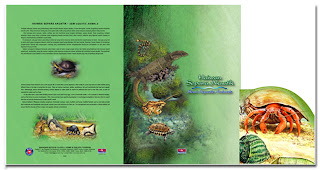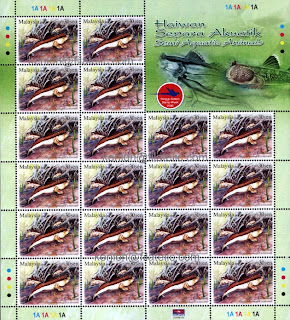 Semi Aquatic Animal
Semi Aquatic AnimalSeveral animals have evolved to live a semi aquatic life, of which their survival depends on their ability to access dry land and water habitats during different times of the day or during their life cycle. There are various mammals, reptiles, amphibians, fish and invertebrates that lead semi aquatic lives. Interestingly, various terrestrial-dwelling animals depend on water bodies to search for preferred food such as the Otter civet, or even for reproductive needs such as frogs.
 On the other hand, some water-dwelling animals come out to land to lay eggs, such as freshwater turtles, or for courtship or territorial displays, such as that shown by some mudskippers. Often, these animals have specific physiological or morphological adaptations that allow them to exploit both the wet and dry environments for their specific needs.
On the other hand, some water-dwelling animals come out to land to lay eggs, such as freshwater turtles, or for courtship or territorial displays, such as that shown by some mudskippers. Often, these animals have specific physiological or morphological adaptations that allow them to exploit both the wet and dry environments for their specific needs.Natural habitats in Malaysia including mangroves, freshwater swamps, rivers, mudflats and human modified habitats such as rice fields provide both vertebrate and invertebrate semi aquatic animals space and resources for their use. The management and conservation of these habitats will ensure that the diversity of these unique semi aquatic animals is maintained.
 Mudskipper
MudskipperCommonly seed on the inter-tidal zone of mudflats, these fishes are semi aquatic in nature and able to stay out of water for extended periods of time as long as there is water in their gill cavities. They are carnivorous and feed on smaller organisms such as crabs and snails and even small mudskippers.
 Hermit Crab
Hermit CrabThese crabs use the empty shells of other animals to live in and although semi aquatic in nature, have adapted to a terrestrial environment, returning to water only for short periods to lay eggs. In mangrove environments, most of the time hermit crabs are active at night and they feed on both decaying plants and animals.
Asian Box Turtle
Responding to threatening situations, this semi aquatic turtle is able to hide its head and limbs completely in its shell. It is a lowland swamp species and is commonly captured in rice fields and other human modified wetland habitats. This species eat both plants and animals and is often caught for food and pet trade.
Otter Civet
Little is known about the ecology of this entirely dark brown and rare semi-aquatic mammal, apart from the fact that it very much associated with water compared to other civets. it has been recorded to occur dwell in both mature and secondary forests and its diet is known to include aquatic animals.
Common Monitor Lizard
This is one of the largest lizards in the world and its semi-aquatic nature allows it to inhibit in a wide range of habitats including mangroves, inland swamps and montane mountain forests. It is active during the day, feeding on various vertebrates and invertebrates with crabs and frogs being the preferred food.
 Four-Lined Tree Frog
Four-Lined Tree FrogCommonly seen in undisturbed habitats, this frog is rarely found in primary forests. Semi-aquatic in nature, males can be seen to fromare known to form calling groups around water bodieshabitats, attracting females to lay their eggs for them to fertilize. Adults feed on a variety of invertebrates and insects.
Triangle Keelback Snake
Found mainly in the lowlands, this semi-aquatic snake has nonetheless being recorded in forests at 1,400 meters elevation. It has been recorded known to feed on rodents, birds and frogs. Females of this reptile species are able to lay several clutches of 5-8 eggs per year.
 Technical Details
Technical DetailsDate of Issue : 9-Oct-2006
Stamp Value : 30 Sen, 50 Sen, RM1
Stamp Size : 40 mm X 30 mm
Miniature Sheet Value : RM 1 X 4
Stamp Size in Miniature Sheet : 29 mm X 34 mm
Perforation : 14 Stamps
Sheet Content : 20 Stamps
Paper : SPM Watermarked, Phosphor Coated
Printing Process : Lithography
Printer : Percetakan Keselamatan Nasional Sdn Bhd
Stamp Designer : Hazel Design
First Day Cover Value : 30 Sen
Presentation Pack Value : RM 4.00
Folder Value :RM 5.00
|
|








0 comments:
Post a Comment